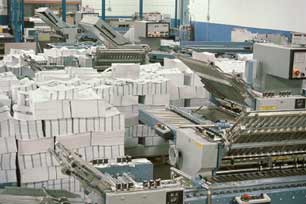|
According to the Greeting Card Association, 90% of all US households buy greeting cards, with American consumers purchasing approximately 7 billion greeting cards each year. In the UK, a typical year sees over 2 billion cards sold. Between just those two countries, if the purchased cards were aligned end-to-end, they would stretch around the world 54 times.
Greeting cards bring many people joy, lifting their spirits, wishing them well, and adding to
 celebratory events. But beyond the typically gouge-me prices we pay when we purchase a paper greeting card, are there any other drawbacks to this global blizzard of snail-mailed greeting cards? Yep, and we'll lay those out. But lest you think we're about to tell you that greeting cards are evil and you should stop sending them, let us reassure you that this is not the case—you will still be required to send Grandma Gertie and other important people in your life occasional reminders that you love them. There is, however, a more environmentally conscious way to do it.
celebratory events. But beyond the typically gouge-me prices we pay when we purchase a paper greeting card, are there any other drawbacks to this global blizzard of snail-mailed greeting cards? Yep, and we'll lay those out. But lest you think we're about to tell you that greeting cards are evil and you should stop sending them, let us reassure you that this is not the case—you will still be required to send Grandma Gertie and other important people in your life occasional reminders that you love them. There is, however, a more environmentally conscious way to do it.
Virgin paper and other resource use. The billions and billions of greeting cards the people of the world use each year require a lot of paper. While there are some greeting card manufacturers using recycled paper for their greeting cards, it's fair to say that recycled paper is not a big focus in the industry. Other environmentally damaging manufacturing practices are often
 used to make paper greeting cards, such as toxic printer inks and fixing agents. Again, there are some manufacturers that are using less toxic alternatives, but even in the best case, there is still energy being used and some level of pollution generated to produce the pretty paper greeting cards.
used to make paper greeting cards, such as toxic printer inks and fixing agents. Again, there are some manufacturers that are using less toxic alternatives, but even in the best case, there is still energy being used and some level of pollution generated to produce the pretty paper greeting cards.
Added mail weight. Even though the mail carrier would usually have something else to deliver to your mailbox anyway, the sheer weight of all the greeting cards mailed annually adds to the fuel-consumption requirements associated with shipping them by 18-wheeler, plane, and mail truck.
Disposal. Some greeting cards get saved "forever," but not most. We just don't have the closet space! Sooner or later, our heart-felt greeting cards go to landfills or recycling centers. Even in the better latter case, there are energy and pollution costs associated with transporting and converting the old greeting cards into reusable paper.
Now, to be fair, these issues are true for just about any manufactured product. Everything that gets made, used, and disposed of has energy and pollution costs, so the bottom line really is: Can we find greener ways to do the things we find useful or pleasurable? In the case of greeting cards, there are such solutions.
With the rise of the internet, e-greeting cards are everywhere. There are e-greetings companies running for-profit sites, there are non-profit organizations using e-greeting cards as a way to bolster membership, and there are independent artists and photographers using e-greetings as a way to expose their wares to the public. The number of styles and themes is astounding.
In cases where the person to whom you're thinking about sending a paper card has an email account, why not send an online greeting card instead of a paper card? Many of the online greeting cards are just
 as good—and often funnier (if funny is what you're looking for)—than their paper counterparts. Electronic greeting cards are easy to find for any occasion, and they're easy to send.
as good—and often funnier (if funny is what you're looking for)—than their paper counterparts. Electronic greeting cards are easy to find for any occasion, and they're easy to send.
If you have a particular fondness for animals, flowers, nature scenes, and environmental messages, we've collected a number of sites and pages that feature such greeting cards on our greeting card resources page.
Sometimes nothing will do but a paper greeting card. That's understood. But you'd probably agree that the card isn't so important that part of a tree from a virgin forest should be used to make it. Yes, believe it or not, even though there are many, many worldwide acres of tree plantations growing trees destined to become paper, we're still chopping down millions of acres of virgin forest each year to make paper products at the same time we send millions of tons of paper to landfills, unrecycled.
For greeting cards, the solution is to buy cards that are manufactured using recycled paper. There are various levels of recycled content; the higher the better:
- GOOD: The greeting card mentions recycled content in any way.
- BETTER: The greeting card makes a claim of "100% recycled paper."
- BEST: The greeting card makes a claim of "100% recycled paper" with "100% post-consumer content (PCC)" specified.

This example shows recycled content that falls somewhere between "GOOD" and "BETTER." A higher post-consumer content percentage would be preferable.
If you're shopping in a greeting card shop, the card or box will usually describe the recycled paper characteristics (if any) on the back. If you're shopping online for boxes of paper greeting cards, you may need to check the site's "About Us" page or other pages to find out the company's position on using recycled paper. Another environmental plus to look for is chlorine-free paper.
If your locale has a mixed-paper recycling program, you can just put your old greeting cards in with the newspapers and magazines.
The World Environment Organization has a few other creative suggestions on what to do with an old greeting card:
- Use it as a bookmark.
- Make it into a gift tag by cutting the old card with scissors or pinking shears. Add the name and a note inside.
- Cut off the side with the picture (if there is no writing on the reverse side) and reuse it as a post card. You'll pay only postcard postage rates!
Do you have other ideas on what to do with old greeting cards? Send them to us at contact@grinningplanet.com.
Do you know someone who might like this article? Send it to them.
Related articles:
More articles and resources on....
Get Grinning Planet free via email
|


